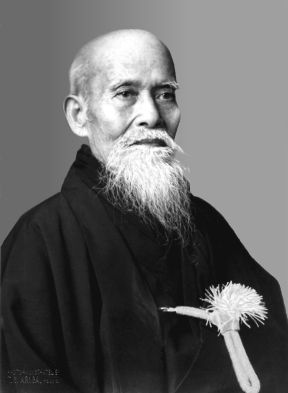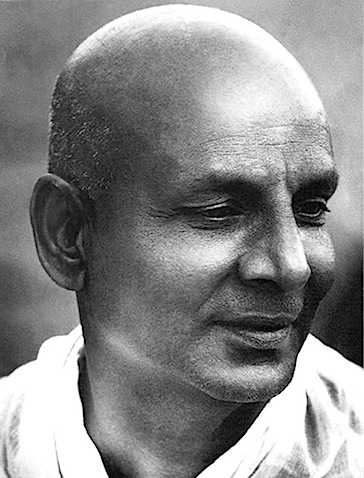Sage Advice

“Spring forth from the Great Earth;
Billow like Great Waves;
Stand like a tree, sit like a rock;
Use One to strike All.
Learn and forget!”
–Morihei Ueshiba (Japanese Martial Artist and Founder of Aikido, 1883-1969)
Detaching from Mistakes

“Do not brood over your past mistakes and failures as this will only fill your mind with grief, regret and depression. Do not repeat them in the future.”
–Sri Swami Sivananda (Indian Physician and Spiritual Teacher, 1887-1963)
Surrendering Desire

“The Bhagavad-Gita : Krishna’s Counsel in Time of War (Bantam Classics)” (Bantam Classics)
“When a man surrenders all desires that come to the heart, and by the grace of God finds the joy of God in himself, then his soul has indeed found peace.”
–Bhagavad Gita (Ancient and Sacred Sanskrit Poem Incorporated into the Mahabharata)
Witness Consciousness

“Discover all you are not. Body, feelings, thoughts, ideas, time, space, being and not being, this or that – nothing concrete or abstract you can point out to is you. You must watch yourself continuously – particularly your mind – moment by moment, missing nothing. This witnessing is essential for the separation of the self from the not-self … be aware of that state which is only, simply being, without being this or that or the other.”
–Sri Nisargadatta Maharaj (Indian Spiritual Teacher and Exponent of Jnana Yoga and Advaita Doctrine, 1897-1981)
Surrender and Detachment

Detachment and surrender are not popular these days, even amongst many spiritual seekers.
But is it worth thinking about the value of each.
“All men are made in God’s image; but to be in His likeness is granted only to those who through great love have brought their own freedom into subjection to God. For only when we do not belong to ourselves do we become like Him who through love has reconciled us to Himself. No one achieves this unless he persuades his soul not to be distracted by the false glitter of this life.”
–St. Diadochos of Photiki (Theologian, Mystic, and bishop of Photice, Epirus, c.400-c.486)
On Spiritual Knowledge: “Philokalia Vol. 1”, p. 253, text 4:
Work, Stress, Vacations and Exotic Drinks with Little Umbrellas in Them

Your humble reporter has often spoken about his brush with burnout.
Even though I was a recognized expert on stress – and a former meditation teacher, no less! – I got perilously close to the edge. Fortunately someone noticed and I was packed off on vacation. It was remarkable that just a week in the Caribbean followed by an unforgettable one-week retreat in the Catskills was enough to cure me. My resting pulse rate fell from 68 to 48, where it stayed for more than a year, and I never again had any symptoms. The key point was that the short break was enough to interrupt the downward spiral and provoke the cognitive shift that prevented me from ever again making the mistakes that lead to the trouble in the first place.
I still work hard, but trust me when I say that working 16-17 hours a day, seven days a week is preposterous. Neglecting your emotional health and social life is bad enough. But the last straw was to stop engaging in spiritual practices that I had followed since childhood.
For a long time now I have been teaching that most people can make phenomenal changes in a very short period. It may take you a long time to prepare, but once you are ready change can be extremely quick. If you think about it, the actual physical business of an egg and a sperm joining to make a new life takes less than a minute. But the preparation for the event may take half a lifetime. At least I hope for your sake that it takes a lot longer than a minute…
And that’s all that I am going to say about that…
I was thinking about all this the other day when a stressed executive was telling me that he all he wanted was to spend six months sitting on a beach. In fact that would probably be a thoroughly bad idea.
It is not the time; it is the quality of the time, and the energy that you bring to it.
I cannot stress enough that for most people energy management is far more important than time management.
When it comes to beating burnout, the kind of vacation is likely more important than its length.
A summary of ten years of research by a team lead by Dov Eden, an organizational psychologist from Tel Aviv University’s Faculty of Management, was presented at last year’s meeting of “Work, Stress and Health” in Miami. The event is sponsored by the American Psychological Association and what Professor Eden had to say really supports what we have been talking about.
For the past ten years the team has been studying “respite effects,” which measure relief from chronic job stress during and after vacations away from the workplace. They have also been looking at the impact of constant contact: the revolution in telecommunications has kept some people permanently wired into the office while they are supposed to be away putting their feet up and drinking exotic concoctions with little umbrellas in them. So we are losing true “respite relief,” and that in turn is a cause of chronic job stress.
One recent study involved 800 professors from eight Universities in Israel, the United States, and New Zealand. The researchers measured stress levels before, during, and after a sabbatical leave of a semester or a whole year. They compared them with people who stayed home, and others who just took a long weekend or a one-week vacation. They found that those who took a long sabbatical break experienced about the same amount of stress relief as people who had taken either a week off or just a long weekend or long-weekend vacation. And all three groups returned to pre-sabbatical stress levels in about the same amount of time: approximately three weeks.
Some of Eden’s other studies have indicated that people who best succeed in uncoupling from work and detaching form its demands, get the most benefit from their vacations and they probably less likely to experience job burnout. It’s the ones who cannot detach from the constant flow of job-related demands that are most likely to suffer from burnout.
The key to a refreshing vacation is to create as much space as possible between you and your work life. I once knew someone who spent a week on Tioman Island in the South China Sea. It is reputed to be one of the most beautiful places on earth, which was one of the reasons why it was selected for the filming of South Pacific. For the whole week she spent all day every day working, and every day the hotel’s fax machine got jammed with the 60-70 pages that she sent out. That is not a recipe for a refreshing, life affirming vacation.
This body of research confirms what most sensible managers have worked out for themselves. When someone goes on vacation they should leave their cell phones behind and not check their email. People who feel attached to the office 24/7 are setting themselves up for long-term stress-related illnesses.
I get a lot more email and phone calls than most normal mortals, yet many years ago I made a remarkable discovery.
I had been out of contact for a week, and even after disposing of the spam and junk mail, there were still well over a thousand messages “demanding” my immediate attention. But during that week away, events had moved on, most no longer needed any input from me at all. Matters had been resolved and solutions found. We lost no business, and I have it on good authority that the earth did not fall into the sun.
I came back rested and restored, and firing on all cylinders: everyone benefited.
Quite obviously it is not a good idea to be completely un-obtainable. I have had two friends, one of whom lost her mother and another his wife, and neither heard the sad news for more than a week. So even when I am in some far flung part of the planet I make sure that there is a way for me to be contacted, But only three people know how.
And I am no longer an electron junkie.
Try it the next time that you have a chance. It really is easier than you think.
“Let all bitterness, and wrath, and anger, and clamor, and evil speaking, be put away from you, with all malice; and be ye kind to one another, tenderhearted, forgiving one another, even as God, for Christ’s sake, hath forgiven you.”
–The Bible, Ephesians 4:31-32
“Detach yourself from all that makes your mind restless. Renounce all that disturbs its peace. If you want peace, deserve it.”
–Sri Nisargadatta Maharaj (Indian Spiritual Teacher and Exponent of Jnana Yoga and Advaita Doctrine, 1897-1981)
“You must have been warned against letting the golden hours slip by, but some of them are golden only because we have let then slip by.”
–Sir James Matthew (J.M.) Barrie (Scottish Writer and Playwright, 1860-1937)
Overcoming Rejection

I am sure that most of us have faced some form of rejection at some time or other in our lives. People with high self-esteem seem better able to take rejection in their stride, but usually only if it is “earned.” Simply trying artificially to build your self-esteem rather than having built it on a platform of past achievement, will probably not work very well.
New research in the journal Psychological Science from UC Berkeley indicates that this does not mean that people with low self-esteem are doomed to respond defensively to criticism and rejection. The key seems to be that people who are better at controlling their impulses are less vulnerable to rejection.
There were 38 female and 29 male participants in the study. The first completed the Rosenberg self-esteem scale, one of the most widely used self-esteem measure in the social sciences. They then completed a questionnaire on their ability to focus on tasks at hand without distraction. The subjects were arranged into two groups – low self-esteem and normal-to-high self-esteem – based on their scores on the Rosenberg scale.
Each of the volunteers then viewed images showing positive, neutral, negative and rejection themes while being subjected to sporadic loud noises. A startle probe measured the force of their eye-blinks in response to the abrupt sounds. Eye blinks are a good measure of the startle response and correlate fairly well with the activation of the “fight or flight” reaction.
As anticipated, all the participants blinked more strongly when the loud noise was paired to such negative images as dead animals or mutilated bodies. However, the people with low self-esteem blinked more forcefully in response to pictures portraying themes of rejection loneliness and alienation. Paintings with negative themes or acceptance themes, such as lovers embracing, did not elicit the same response in low self-esteem people.
In other words the powerful was in which rejection activates the threat system in people with low self-esteem suggests that their fear of rejection runs extremely deep and engages neurological systems involved in reacting to a threat.
On the other hand, those with low self-esteem who scored higher for attention control, which included the ability to focus, were able to modulate their immediate reactions to rejection.
Some previous work has suggested that self-esteem is part of a primitive emotional warning system that warns us if we are in danger of being socially excluded. While the evolutionary function of this detection system was originally intended to motivate people to stay socially connected, the constant anticipation of rejection can create problems, with the system being triggered by the merest whiff of rejection. They may become hypersensitive and have a brain that generates a cascade of defensive reactions if they sense any kind of disapproval.
Although this is a small study, the evidence is that rather than teaching self-esteem skills, the solution for them might be to improve their abilities to focus, concentrate and regulate their internal states.
In other words develop some specific forms of self-control and resilience.
For many people this may be the most effective way of helping them to cope with disappointment and maintain close relationships.
“No man is free who is not master of himself.”
–Epictetus (Phrygian-born Greek Stoic Philosopher, c.A.D.55- c.A.D.135
“It is not the mountain we conquer but ourselves.”
–Sir Edmund Hillary (New Zealand Mountaineer and Explorer, 1919-
“Mind control is not one’s birthright. The successful few owe their success to their perseverance.”
–Ramana Maharshi (Indian Hindu Mystic and Spiritual Teacher, 1879-1950
“The cyclone derives its powers from a calm center. So does a person.”
–Norman Vincent Peale (American Cleric, Writer and Self-Help Expert, 1898-1993)
Counterfactual Thinking

Most of us have experienced the “I should have,” “I could have,” “If only I” and “I would have” moments. Times when we lament our missteps. We say to ourselves that we should have invested in a certain stock, should have married Agnes or become a doctor instead of a cab driver. Though it can be positive, for some people this kind of thinking becomes so pervasive that they simply cannot take any action in the present. So anything that we can learn about this process will likely help a great many people.
We refer to this process in which we evaluate how we would do things differently, as “counterfactual thinking.” Though it can be positive, and help us learn from our mistakes, it is a common psychological mechanism that causes us to harbor feelings of disappointment and regret. For some people this kind of thinking becomes so pervasive that they simply cannot take any action in the present. So anything that we can learn about this process will likely help a great many people.
A common research strategy in the study counterfactual thinking, is to have people read stories in which the main character makes decisions that will ultimately doom him or her to failure. Researchers then ask them how they would have done things differently.
But this method may not provide a complete picture of this mental process. New research published in the June issue of Psychological Science, which is a journal of the Association for Psychological Science, shows that our counterfactual thinking may be markedly different when we are actually experiencing failure rather than reading about someone else’s.
In a series of experiments, Vittorio Girotto of the University luav di Venezia in Venice, Italy and his colleagues attempted to demonstrate and explain the differences in counterfactual thinking between actors who actually experienced the problem and readers who just read about it.
The experimental subjects were divided into two groups:
- Actors who were asked to participate in a game in which they could win a reward by solving a math problem. They were then asked to choose one of two sealed envelopes: One was said to contain a difficult problem, and one supposedly contained an easy problem. In reality, both envelopes contained a problem that was nearly impossible to solve in the allotted time. Once the actors failed, they were asked to write at least one way in which things would have been better for them.
- In the second group, “Readers” read a story with a protagonist who faced the same choice and ended with the same negative outcome as the subjects did in the actor condition. Like the actors, readers were required to write at least one way in which things would have been better for the protagonist.
The readers and actors were very different in their counterfactual thinking. Readers tended to undo the protagonist’s choice to tackle the problem, while actors changed the way in which they tried to solve the problem. So a reader would say, “I should have picked another envelop,” while the actor would ask if he could use a calculator.
These results run counter to previous theories of counterfactual thinking. It was assumed that people who read a story construct the same counterfactuals as people who experienced the events described in the story. It was also believed that actors tend to avoid self-blame at all costs when thinking of alternatives. Instead, the actor-reader differences emerged even in conditions in which actors’ decisions made the best decisions that they could. The researchers said,
“Actors and readers produce different counterfactuals because they rely on different information, not because they have different motivations.”
In both cases, “what might have been” thinking can be stressful.
This research confirms something that we have been teaching for years:
Learn to detach from your aims and desires: you need passion and purpose. But you do not need the third “P:” Pain
Liberate yourself from the past: Healing, Meaning and Purpose has a whole section on novel ways to get rid of some of the “stuff” that most of us carry around in our bodies, our minds and our subtle systems.
Depression, Folic Acid and Bread

A remarkable study was published in the July edition of the Journal of Epidemiology and Community Health, by researchers at the University of York and Hull York Medical School.
They reviewed 11 studies involving 15,315 individuals and confirmed that there is a link between depression and low levels of folate, a vitamin that comes primarily from leaf vegetables such as spinachturnip greens, dried beans and peas, fortified cereal products, sunflower seeds and certain other fruits and vegetables are rich sources of folate, as is liver. and
Last month, the British Food Standards Agency recommended to Health Ministers that they should introduce mandatory fortification of either bread or flour with folic acid to prevent neural tube defects, which can result in miscarriage, neonatal death or lifelong disability. This new study suggests that the measure may also help to reduce the frequency and severity of depression.
Lead author Simon Gilbody said:
“Our study is unique in that for the first time all the relevant evidence in this controversial area has been brought together. Although the research does not prove that low folate causes depression, we can now be sure that the two are linked. Interestingly, there is also some trial evidence that suggests folic acid supplements can benefit people with depression. We recommend that large trials should be carried out to further test this suggestion.”
Recent research from the same team published in the American Journal of Epidemiology has also shown that people with depression, bipolar disorder and schizophrenia commonly have a genetic mutation named MTHFR C677T in the 5,10-methylenetetrahydrofolate reductase (MTHFR) gene on chromosome 1. The enzyme that the gene codes for is involved in folate metabolism, and the mutation (polymorphism) means that they process folate less efficiently. Folate is linked to the production of some of the chemicals in the brain, including serotonin, that in some part some the brain elevate mood. The identification of this gene provides a plausible explanation as to why folic acid supplements may help people with depression.
There is also another implication of the finding: it is well known that some diseases are more common in people who have depression, bipolar disorder and schizophrenia, including coronary artery disease ad some forms of cancer.
This same genetic polymorphism has been linked to cancers of the breast and lung, as well as coronary artery disease. It may be that folate is one of the factors involved in both.
Yet another research project!









